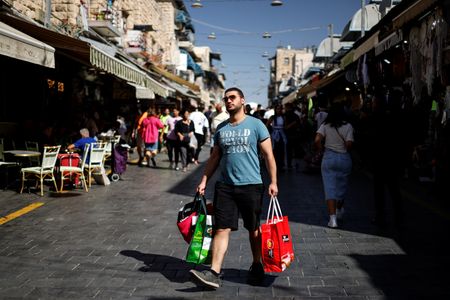By Steven Scheer
TEL AVIV (Reuters) – Israel’s economy grew 6.5% in 2022 – slower than 2021’s 8.6% expansion but still much stronger than most Western countries – the Central Bureau of Statistics said on Thursday, citing solid growth in consumer spending, exports and investment.
The full-year reading exceeded the 6.3% projected by the Bank of Israel and the Finance Ministry following a faster-than-expected annualised 5.8% expansion in the fourth quarter, according to an initial estimate.
A Reuters poll of economists had forecast growth of 2.5% in the final three months of last year.
In 2022, the average growth among OECD nations was 2.8%.
On a per capita basis, Israel’s economy – which produced some $500 billion last year – grew 4.4% versus an OECD average of 2.6%.
Helped by a surge in immigration from former Soviet states and a decline in mortality, Israel’s population rose 2.2% last year and now stands at 9.66 million.
The bureau noted that should this rapid increase continue, Israel’s population will reach 10 million in mid-2024. Should it rise at a more normal rate of 1.8%, the 10 million mark will be hit by the end of next year, it said.
Economic growth in Israel is expected to slow sharply in 2023 to a rate of near 3%, with central bank rate hikes expected to dampen spending.
The strong growth data come after the bureau on Wednesday reported that Israel’s inflation rate rose to 5.4% in January -its highest rate since October 2008 – from 5.3% in December.
The Bank of Israel has steadily raised its benchmark interest rate to 3.75% from 0.1% last April in a bid to rein in inflation. Policymakers are expected to raise the rate to at least 4% at its next rates decision on Monday.
Despite rising prices and a very high cost of living, economic growth in 2022 was led by a 7.5% gain in consumer spending – more than half of economic activity – while exports grew 7.9% and investment in fixed assets rose 9.3%.
More than half of Israel’s exports come from a booming high tech sector, which accounts for 11% of the country’s workforce and 15% of total economic activity.
(Reporting by Steven Scheer; Editing by Alison Williams and Hugh Lawson)

